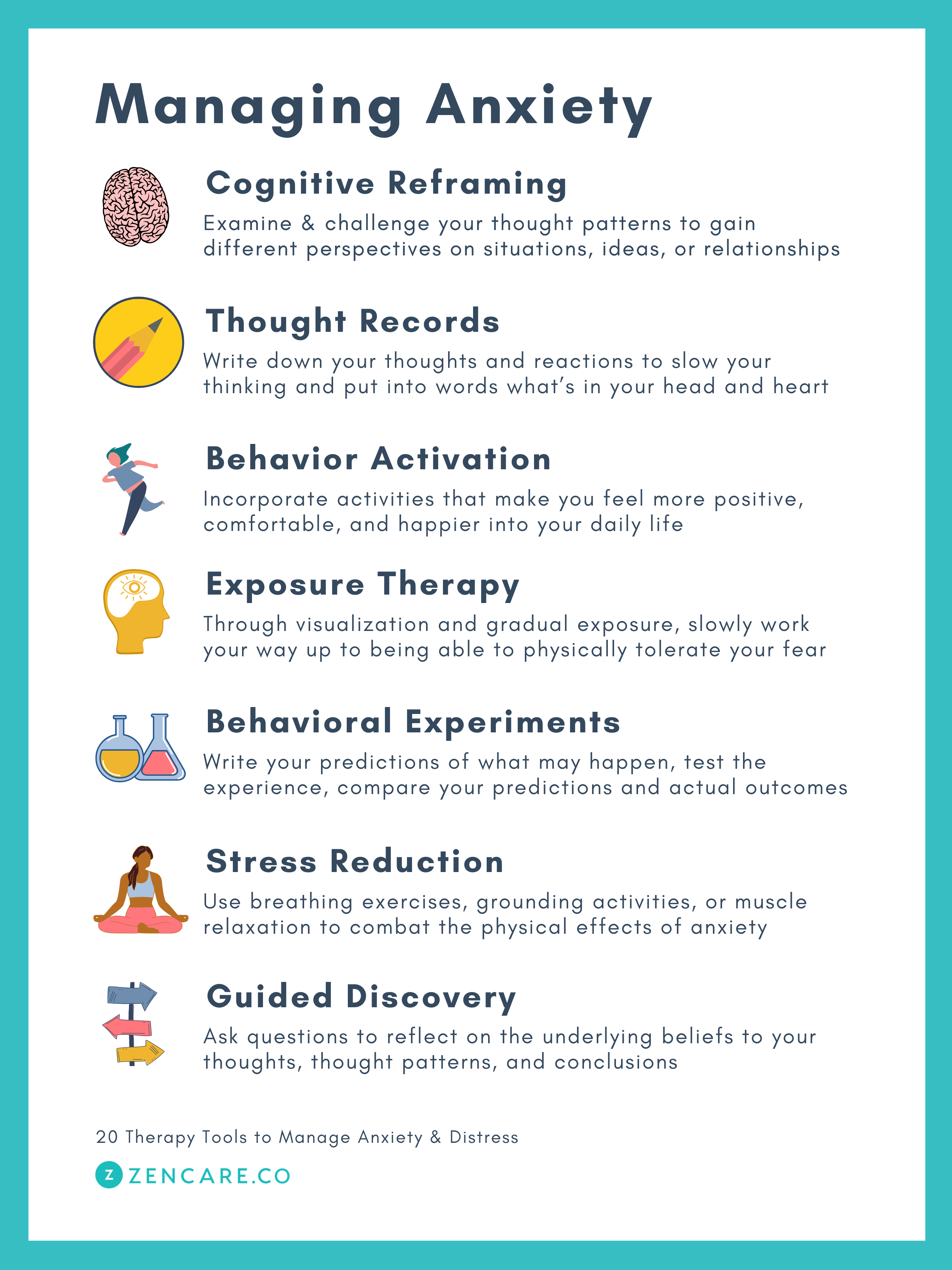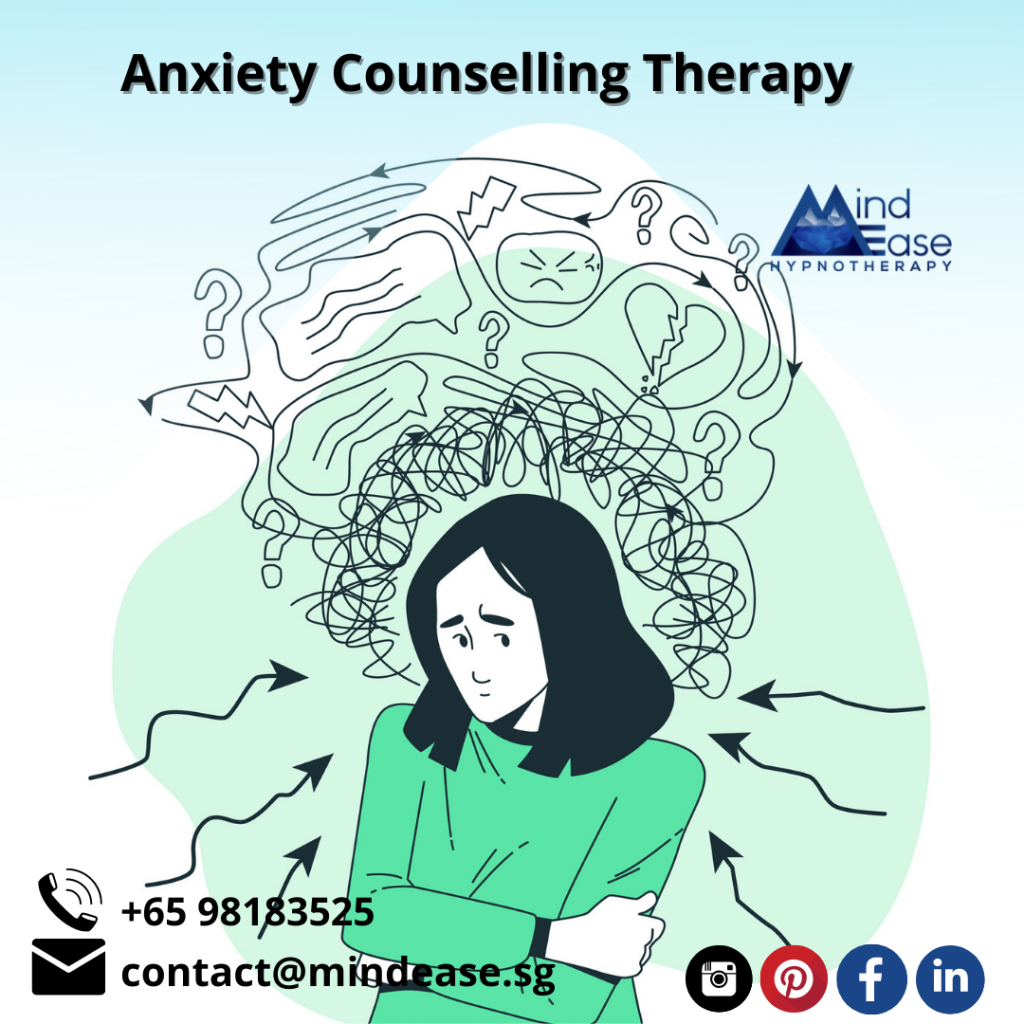Discovering Various Techniques in Coaching for Anxiousness Problem for Lasting Change
When tackling anxiety disorders, it's necessary to discover a selection of therapy strategies. Each approach supplies one-of-a-kind insights and devices to aid you handle your signs and symptoms effectively. You might find that combining techniques can yield the very best results. Comprehending the nuances of these strategies is key to cultivating enduring modification. What if the right mix could launch a new degree of psychological health for you?
Comprehending Anxiety Problems: A Quick Summary
Anxiety disorders, which influence numerous people worldwide, can significantly impact day-to-day live. You may experience overwhelming sensations of concern or fret that seem irrepressible. These feelings can lead to physical signs and symptoms like a racing heart, sweating, or even lightheadedness. Usual kinds of anxiety problems include generalised anxiety problem, panic attack, and social anxiousness condition. Each has unique indicators, but they all share a propensity to disrupt your regular and relationships.Understanding the origin of your anxiousness is vital. It may stem from genes, brain chemistry, or life experiences. Acknowledging your triggers can aid you handle your reactions better. It's vital to keep in mind that you're not the only one in this struggle. Many individuals encounter similar difficulties, and looking for help is a solid action toward sensation better. By finding out about anxiousness disorders, you're currently on the course to understanding and managing your condition better.
Cognitive-Behavioral Therapy: Testing Adverse Thought Patterns
In Cognitive-Behavioral Therapy, you'll begin by identifying the negative thought activates that add to your anxiety. You'll work on replacing them with more favorable alternatives once you acknowledge these thoughts. With each other, you'll construct effective coping approaches to help manage your anxiety in daily circumstances.
Determining Unfavorable Idea Triggers

Recognizing the specific triggers behind your adverse ideas can be necessary in handling stress and anxiety when you experience moments of distress. Start by taking notice of scenarios that prompt sensations of worry or fear. Is it a crowded area, a forthcoming due date, or a conversation with certain individuals? Write these instances in a journal. This will help you recognize patterns in your reasoning. Notification physical experiences that accompany your adverse ideas, like a racing heart or rigidity in your breast. By identifying these triggers, you acquire insight right into what's fueling your anxiousness. Comprehending these connections is the very first step in challenging those ideas and ultimately reclaiming control over your emotional responses.
Replacing Thoughts With Positives
Challenging adverse thought patterns is a necessary action in changing your way of thinking and minimizing anxiousness. You may commonly find yourself caught in cycles of insecurity or catastrophic thinking. Rather of allowing these ideas dictate your feelings, method changing them with practical alternatives or positive affirmations. For example, when you believe, "I can't manage this," change it to, "I can take care of challenges one step each time." This easy adjustment can greatly impact your emotional state. On a regular basis recognizing and responding to these adverse ideas aids develop a much healthier inner discussion. Bear in mind, it requires time and initiative, yet consistently exercising this strategy can bring about long-term adjustment, encouraging you to encounter anxiousness with restored self-confidence and durability.
Building Coping Techniques Together
Replacing negative ideas is just the start of handling stress and anxiety efficiently. To create enduring change, you need to construct coping approaches that encourage you. Cognitive-Behavioral Therapy (CBT) helps you identify and test those purposeless thought patterns. Together, you and your therapist can explore how these ideas effect your feelings and behaviors.Start by establishing functional strategies, like journaling or mindfulness exercises, that allow you to challenge stress and anxiety head-on. When you face your worries gradually, you'll discover to respond differently.

Mindfulness and Acceptance-Based Approaches: Growing Present-Moment Understanding
As you navigate the intricacies of anxiousness, integrating mindfulness and acceptance-based approaches can significantly improve your capacity to cultivate present-moment understanding. By focusing on the present moment, you'll find that you can observe your ideas and feelings without judgment (Counseling services for anxiety). This method aids you acknowledge your anxiousness without feeling overwhelmed by it.Engaging in mindfulness workouts, such as deep breathing, body scans, or led meditations, permits you to ground on your own in your current experience. Acceptance-based methods encourage you to embrace your emotions instead than deal with against them. They shed their power over you.Incorporating these practices into your everyday regimen can transform exactly how you react to anxiousness when you approve your sensations. You'll create resilience and discover to navigate demanding circumstances with higher simplicity. Inevitably, growing present-moment recognition lays the structure for lasting change, equipping you to lead a much more satisfying life
Direct Exposure Treatment: Challenging Fears Slowly
Direct exposure therapy helps you challenge your anxieties in a steady means, making it much less frustrating. You'll find out strategies to face anxiety-provoking situations detailed, while likewise developing coping approaches to handle your reactions. This strategy encourages you to take control and reduce anxiety over time.
Gradual Exposure Techniques

When dealing with stress and anxiety, gradually challenging your concerns can be an effective way to regain control. This strategy, referred to as steady direct exposure, includes gradually revealing yourself to the situations or things that cause your stress and anxiety. Start with less intimidating situations and gradually function your method up to even more challenging ones. As an example, if you're afraid of public talking, you might start by speaking before a mirror, then advance to sharing thoughts with a close friend, and eventually deal with a tiny group. Each action helps desensitize you to the worry, developing your self-confidence over time. Keep in mind, it's important to pace yourself website and commemorate tiny victories as you move with this process, enhancing your capacity to take care of anxiousness properly.
Structure Coping Approaches
Structure efficient coping techniques is vital for handling anxiousness, particularly as you challenge your concerns progressively - Counseling services for anxiety. One powerful approach is direct exposure therapy, where you start by encountering your worries in a controlled way. Start with much less daunting circumstances and slowly function your method approximately even more difficult circumstances. This steady direct exposure aids desensitize you to anxiousness causes, making them much less overwhelming.Incorporate leisure strategies, such as deep breathing or mindfulness, to soothe your mind throughout exposure. Track your development, celebrating small victories along the way to increase your confidence. Keep in mind, it's okay to take your time; the goal isn't perfection yet constant renovation. By constructing these strategies, you'll empower yourself to browse anxiousness and welcome life extra fully
Psychodynamic Therapy: Revealing Origin Causes of Stress And Anxiety
Psychodynamic treatment explores the subconscious mind, exposing the source of your stress and anxiety. By examining your ideas, feelings, and past experiences, this approach aids you discover underlying conflicts and unsolved problems that may add to your present anxiousness. You'll collaborate with a therapist to explore youth experiences, relationships, and psychological patterns that shape your feedbacks today.As you get insight right into these deeper layers of your subconscious, you'll start to recognize just how past events affect your present actions. This understanding can bring about catharsis, enabling you to process feelings you may have suppressed.Through the therapeutic partnership, you can likewise identify protection systems that may have created in time, using a clearer path to alter. Ultimately, psychodynamic therapy equips you with the devices to resolve your stress and anxiety at its core, advertising lasting transformation in your emotional health.
Integrative and Alternative Methods: Incorporating Techniques for Greater Efficiency
Integrating different healing techniques can boost your journey toward handling anxiousness better. By incorporating components from cognitive-behavioral therapy, mindfulness methods, and all natural strategies, you can create a tailored technique that addresses your distinct requirements. As an example, you could utilize cognitive-behavioral methods to challenge unfavorable thought patterns while integrating mindfulness workouts to ground on your own in the here and now moment.Additionally, discovering all natural techniques such as yoga exercise or reflection can advertise leisure and lower anxiousness signs and symptoms. This mix permits you to create greater self-awareness and resilience.Experimenting with these diverse techniques can assist you discover what resonates most with you. Bear in mind, it has to do with locating a harmony that works, rather than sticking to a solitary strategy. This integrative method not just provides immediate relief but also cultivates long-lasting skills for handling anxiety, encouraging you to recover control over your life.
The Function of Support Systems: Structure Strength With Connection
While it might seem that managing anxiety is a singular trip, having a strong support system can play an essential role in your resilience. Surrounding on your own with understanding pals, household, or support groups develops a secure area where you can openly share your sensations and experiences. When you attach with others, you remind on your own that you're not alone in this struggle.These relationships use inspiration and can supply functional coping techniques that have functioned for others. It's additionally an opportunity to acquire perspective; pals can assist you see scenarios in a different way, minimizing sensations of isolation.Moreover, psychological support cultivates a sense of belonging, which can significantly minimize anxiousness signs and symptoms. By leaning on your assistance system, you can construct resilience and deal with obstacles a lot more successfully. Keep in mind, reaching out for assistance is an indicator of strength, and it can make all the difference in your journey toward taking care of stress and anxiety.
Frequently Asked Inquiries
What Are the Common Signs of Stress And Anxiety Problems?
You could experience uneasyness, fatigue, difficulty concentrating, impatience, muscle tension, and sleep disturbances. Physical signs can include rapid heartbeat, sweating, and trembling. Identifying these indications early can help you seek appropriate support and therapy.
For How Long Does Treatment Normally Last for Stress And Anxiety Problems?
Treatment for anxiousness problems normally lasts anywhere from a couple of weeks to numerous months. It actually depends upon your private requirements, progress, and the techniques your therapist makes use of to aid you handle your stress and anxiety effectively.
Can Drug Be Utilized Together With Therapy for Anxiety?
Yes, medication can definitely be made use of along with treatment for anxiousness. Incorporating both strategies usually boosts treatment effectiveness, assisting you handle symptoms while discovering underlying problems through therapy (Counseling services for anxiety). Always consult your healthcare provider for tailored recommendations
Are There Self-Help Strategies for Handling Anxiety?
Yes, there are a number of self-help strategies for taking care of stress and anxiety. You can exercise mindfulness, participate in routine exercise, preserve a well balanced diet plan, establish a routine, and make use of deep breathing methods to aid minimize anxiety signs efficiently.
How Do I Know if I Required Professional Assistance for Anxiety?

Comments on “Reclaim your mental well-being through effective therapy for anxiety”